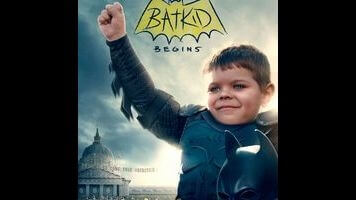Safe to say that everyone with an internet connection is aware of the story of Miles Scott, the 5-year-old leukemia survivor who became Batman for a day courtesy of the Make-A-Wish foundation. What was initially conceived as a relatively small affair ballooned into both a real and virtual world phenomenon. The city of San Francisco was reconfigured as Miles’ Gotham City playground on November 15, 2013, to the tune of $105,000 (ultimately paid off by some wealthy samaritans). More than 25,000 people cheered Miles on as he stopped a bank robbery in progress by the Riddler and rescued San Francisco Giants mascot Lou Seal from the Penguin’s evil clutches. Social media well wishes came from all over the United States and overseas; even President Barack Obama cheered Miles on via Twitter and Vine.
Dana Nachman’s behind-the-scenes look at Miles’ great day, and the many people who made it happen, is a shamelessly manipulative secular-spiritual infomercial to which the term “all the feels” most definitely applies. Is that a bad thing? In a macro sense, absolutely, since this is emotion corporatized and copyrighted—trading on a young boy’s very private pain-and-recovery for maximum, crowd-pleasing uplift, as well as furthering awareness of a branded superhero who just happens to have a new movie out next year. The worst scenes come at the beginning and the end: a montage scored to a treacly children’s choir cover of David Bowie’s “Heroes,” and one interviewee’s sincere suggestion, which the filmmakers do nothing to counter, that Miles is a savior for the human race. (One can only imagine how much further this story’s soon-to-be-filmed fictionalization—with Julia Roberts attached to play tenacious Make-A-Wish CEO Patricia Wilson—will push the Christ child parallels.)
But let’s go micro now, because in-between these bookending sugar rushes is quite a compelling movie, and much of this has to do with the ceaselessly adorable Miles himself. He’s thrilling to watch because he’s in no way as blinkered as the many adults who consider him some kind of messiah. He’s really the human equivalent of a LOLCat—almost entirely unaware of the pleasure he brings to people just by being who he is. His parents Nick and Natalie describe him as shy, but Miles thrives on the crowd’s energy, strutting around San Francisco in his miniature Batsuit with such easy swagger that it’s impossible not to get choked up.
His is not a selfish confidence, though, which makes it even more touching. The best thing Nachman and her co-writer/editor Kurt Kuenne do is show how Miles’ responses to this day of days shift from moment to moment. He’s never consciously showing off, and like any 5-year-old, his needs are unpredictable. When he says he’s ready to call it quits as Batman well before the grand finale at AT&T Stadium (like that’s gonna happen), it’s clear he has no concept of the scale of this production that’s been concocted with him as its star attraction. He’s merely playing in a (very large) sandbox, and he’ll move through it at his own pace, as his interest dictates.
Miles treats this whole experience with an affectingly genuine innocence—something that the filmmakers, and many of the participants, seem to think can be bottled and sold as a soul-cleansing palliative. Tears will be shed, many of them surely genuine. Yet there’s still something about this oversize spectacle, and Miles’ ultimate place in it, that gives nagging pause.


 Keep scrolling for more great stories from A.V. Club.
Keep scrolling for more great stories from A.V. Club.